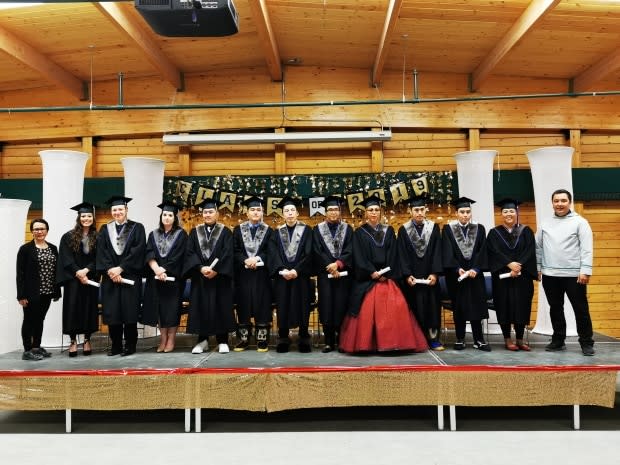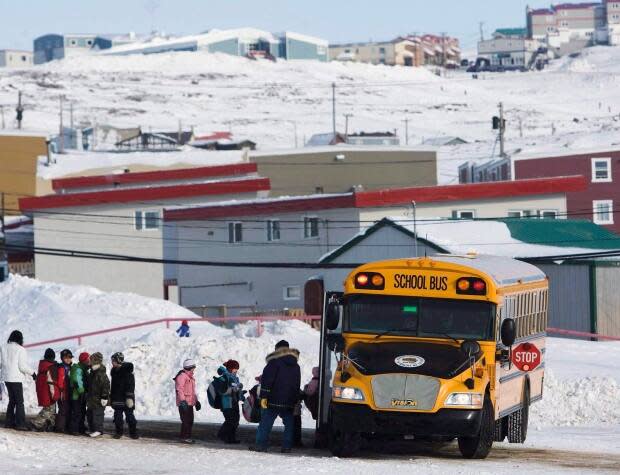OPINION | It's been 49 years since the voting age was lowered. It's time to do it again
Next week, over two million Canadians will not be eligible to vote in the federal election — and in Nunavut alone, over 10,000 people will not be allowed to cast a ballot.
In 1982, the Canadian Charter of Rights and Freedoms embedded into the constitution the right of all citizens to vote. While this freedom is true for most Canadians, currently our laws systematically exclude people under the age of 18 from voting in elections.
It's about time that we changed that.
Many young Canadians under 18 become employed years before they're eligible to vote, with our laws allowing Canadians as young as 13 to become employed.
Once engaged in the wage economy, taxes are collected, and through participation in the labour force, youth become contributors to public funding. Youth are also contributors to our society through volunteering, accounting for 25 per cent of volunteers in Canada.
With youth participating in all factors of public life, it only makes sense that they have a voice in how our government operates. But the impact could be even greater in Nunavut, which boasts Canada's youngest population: according to the 2016 census, over 40 per cent of our people are under the age of 19.
Youth voices invaluable
With such a young population, the current voting age creates large gaps in public services and systematic barriers. One serious and even lethal service gap youth have been vocal about is receiving federally-responsible public services in our Inuit languages: Inuinnaqtun and Inuktitut.
Many Inuit don't speak English as their first language, nor French. Yet, over 20 years after the creation of Nunavut, our public services are still not given in our language, and our only choices are English and French.
There are youth that would benefit from communicating in their language when it comes to public services: education, medical, and mental health services, just to name a few.

Topics that affect youth should have youth first and foremost at the table — they're old enough to contribute and help make decisions for a better Nunavut. Through fair representation, we can shift our resources to become effective, ultimately saving lives.
Many youth are already engaged in politics and are creating a better world; like my niece, Teghan, who recently received her diploma from Kiilinik High School in Cambridge Bay, Nunavut.
Teghan is a great student, a dedicated entrepreneur, and a hard working employee. At Kiilinik High, she enjoyed participating in mock elections that are held in parallel to federal elections, learning about government and following current topics.
Teghan also participated in an annual Nunavut Youth Mock Parliament in the Nunavut Legislative Assembly in Iqaluit, where students take on roles of Members of the Legislative Assembly. During the informed discussions, students are vocal about what is needed in order to improve the quality of life in Nunavut.
In the mock sessions, students discuss challenges and solutions; solutions our leaders need to be listening to. One of the challenges discussed was the education system, and how its failing our youth in many ways, a system contributing to a low 68 per cent attendance rate across Nunavut.
The youth asked for the curriculum to include Inuit knowledge and language — and not only Western knowledge — to get school attendance and graduation rates up.
Teghan and her contemporaries showed that youth have a place in policy discussions, and also gave a great example of the kind of topics that most need their input.
Nunavut's outdated and irrelevant curriculum needs a reform, and youth need to be a part of that reform. Don't we want to raise our children to be the best adults they can be?

Time to make a change
Canada is benefiting from driven youth, some of which are also driving motor vehicles on public roadways by age 15, yet they cannot vote until age 18. Most provinces in Canada have set 16 as the minimum age requirement to be eligible for a learner's permit. In Alberta, a learners permit can be attained at 14, in Nunavut, 15.
Wouldn't it make sense for youth to have the option to drive to the nearest polling station to go vote too?
In the last federal election, voter turn out was only 68 per cent across Canada, and only 57 per cent of Canadian youth aged 18 to 24 years old cast a vote. Let's continue to improve equity for everyone.
Lowering the voting age will increase the number of voters and help foster the habit of voting, thus creating more young people who are engaged and educated about our government. We already know so many young Canadians who are engaged and eager to help create a better, more inclusive country. It's the leaders that need to do more.
If you're wondering, the voting age was last changed 49 years ago in 1970, from 21 to 18. Changing the rules of voting isn't new. Women were not eligible to vote until 1917, and Indigenous peoples only got their right to vote in 1960.
We must continue to strive for equal representation. It's time we start talking about lowering the voting age again.
This column is part of CBC's Opinion section. For more information about this section, please read this editor's blog and our FAQ.


